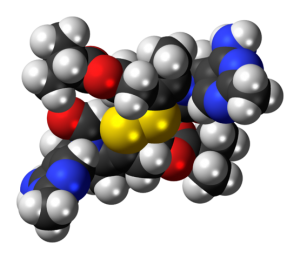Over-the-counter nootropic Sulbutiamine may have cognitive benefits, but more research is needed.

- Resistance to physical and mental fatigue. Sulbutiamine is used to treat asthenia and may have potential for helping other fatigue-related conditions.
- Support of memory and overall cognitive health. Sulbutiamine may help resist memory decline and cognitive dysfunction, possibly by reversing vitamin B1 deficiency.
Overview
Also known by its brand names Ereon, Arcalion, Bisibuthiamine and Youvitan, sulbutiamine (Su) is a synthetic compound made of two molecules of vitamin B1 (thiamine) bound by a sulfur group.1
Sulbutiamine was initially synthesized in Japan as a complementary treatment for vitamin B1 deficiency and asthenia (lack of strength or energy), with the initial studies of its effects documented in the early 1970s. It is the only anti-asthenic compound known to effectively cross the blood-brain barrier and to selectively act on specific brain structures involved in asthenia.
In the brain, Su is metabolized to vitamin B1 and related compounds such as thiamine triphosphate (TTP), which participates in the regulation of the synaptic neurotransmission.
Su is sold as a nootropic drug available over the counter in most countries, even though research data to support its psychoactive benefits is lacking.

How Sulbutiamine Might Help the Brain
Several potential mechanisms of sulbutamine’s actions have been identified. However, because of the scarcity of research and lack of human trials, they require further confirmation to be accepted.
Potential improvement of neural signaling within the brain
Based on a study in rats, Su may protect the brain’s hippocampal pyramidal neurons from oxygen and glucose deprivation.3
Potential regulation of glutaminergic and dopaminergic transmission
Su may also work by modulating the brain’s usage of the neurotransmitters dopamine and glutamate; injection of Su in rats was found to influence levels of dopamine and its metabolite 3,4-dihydroxyphenylacetic acid.4
Potential enhancement of the brain’s cholinergic activity
Behavioral studies in mice have shown that Su improves learning and memory through an increase in hippocampal cholinergic activity, which is linked to the neurotransmitter acetylcholine.
Potential regulation the sleep-wake cycle
Semi-chronic treatment with Su has been shown to promote wakefulness in monkeys.5However, evidence for this comes from only a single study with a small sample size.
Sulbutiamine’s Potential Benefits
Sulbutiamine is marketed primarily as a nootropic drug. Supplement manufacturers claim that sulbutiamine supports memory, attention, mental stamina, and other aspects of cognitive function. Although there is some evidence of cognitive benefit in animal studies, there is currently not enough human data to substantiate these claims.
In addition, sulbutiamine may help with some symptoms of major depressive disorder, although more research is needed. Some chronic fatigue syndrome (CFS) sufferers have also found it to be helpful as an off-label medication.
Research
Animal Research
Sulbutiamine research is relatively scarce, but animal data reports that it may:
Human Research
There is currently not enough data to substantiate the neurological benefits of Su. Moreover, the majority of studies on Su have been performed in France, and the English data is only available in the form of abstracts, therefore limiting the interpretation of these studies.
Su (400-600 mg) might help alleviate chronic post infectious fatigue
In this randomized, double-blind study, 326 patients suffering from chronic post infectious fatigue (CPIF) were treated with Su, 400 mg daily, Su, 600 mg daily, or placebo for 28 days. Su supplementation did not result in any significant effects on the study groups. Although on the 7th day of treatment women receiving Su 600 mg had less fatigue, no persistent effect was observed by the 28th day of treatment.
- The researchers concluded that “the effect observed after 1 week in women represents a true finding that needs additional research. Further studies are in progress in order to characterize better the potential usefulness of Su in chronic fatigue”9
Su may improve attention in early Alzheimer’s, and boost the action of other Alzheimer’s drugs
In this randomized, double-blind trial, patients diagnosed with the early stage Alzheimer’s were treated with Su (Arcalion) or a cholinesterase inhibitor (Donepesil) for three months. Among the assessed cognitive functions (episodic memory, working memory, executive functions, attention) only attention was improved in both groups. For the three following months, Donepesil-treated patients were supplemented with placebo, and the Su group added Donepesil to their treatment. Attention, episodic memory and daily life activities improved in the combination treatment group.
- The researchers concluded that “Sulbutiamine can be an adjuvant to treatment in early stage and moderate AD by anticholinesterasic drugs” 10.
Su (600 mg) might improve the clinical symptoms of major depressive disorder
The purpose of this randomized, double-blind trial was to determine the safety and efficiency of Su in the therapy of psycho-behavioral symptoms in patients experiencing a major depressive episode (MDE). The study subjects were treated with Su (600 mg) or Clomipramine (75 to 150 mg daily) for 8 weeks. The patients treated with Su were significantly less disabled than the placebo group in all the aspects of psycho-behavioral inhibition such as the cognitive, emotional and behavioral facets.
- The researchers concluded that “Sulbutiamine has no anti-depressive effect but it can hasten the resorption of psycho-behavioral inhibition occurring during MDE”11
Dosage for Brain Health
- Most human trials of sulbutiamine use doses of 400-600 mg/day
- Commercial supplements provide 200-500 mg sulbutiamine per capsule
Side Effects
In the available clinical studies of Su, no major adverse effects were noted. The common side effects of Su are mostly attributed to the overdose of this preparation and include anxiety, euphoria, irritability, nausea, insomnia, and skin rashes.12 13
Supplements in Review Recommendation
- Sulbutiamine, 400 mg.
Although sulbutiamine research is lacking, it certainly has potential. Most research findings are positive and suggest that sulbutiamine may help with mental fatigue, memory, depression, and other aspects of mental health. Moreover, the popularity of its use as a nootropic warrants trying it out.
400 mg is the dose used by researchers and suggested by nootropic supplements. The most popular sulbutiamine supplements suggest doses of 400 mg, and successful studies have used similar doses of 400 – 600 mg.
References
Leave a Reply